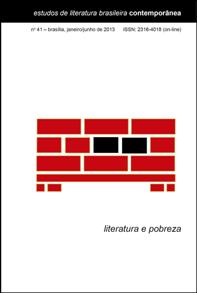O discurso sobre a precariedade em Luiz Ruffato e Arlindo Gonçalves
DOI:
https://doi.org/10.1590/S2316-40182013000100004Palabras clave:
Luiz Ruffato, Arlindo Gonçalves, paisagem, precário, ruínasResumen
Este trabalho visa analisar a maneira como os dispositivos paisagísticos contribuem nos romances Eles eram muitos cavalos, de Luiz Ruffato, e Desonrados e outros contos, de Arlindo Gonçalves, Ã emergência de um discurso sobre o precário. Se a paisagem ocupa, nesses textos, um lugar fulcral na refl exão sobre a degradação social, ela não se limita ao registro nostálgico de um mundo em ruínas. Em ambos os romances, ela constitue tanto o elemento desencadeador do processo de criação artística como o do seu fracasso. À imagem de nossa percepção retalhada do universo urbano degradado, a paisagem assinala aqui a nossa relação defasada com o território do alter.
Descargas
Citas
CHOAY, Françoise (2007). Le règne de l’urbain et la mort de la ville. In: DETHIER, J.; GUIHEUX, A. (dirs.). La ville, art et architecture en Europe, 1870-1993. Paris: Centre Pompidou.
GONÇALVES, Arlindo (2004). Desonrados e outros contos. São Paulo: Marco Zero.
DURANTE, Daniel Castillho (2004). Les dépouilles de l’altérité. Montréal: XYZ.
LEVY, Jacques (2003). Dictionnaire de géographie. Paris: Belin.
MONS, Alain (2007) Le paysage urbain comme chaos. Figures Photographiques. In: SANSON, Pascal (dir.). Le paysage urbain (représentations, signifi cations, communication). Paris: L’Harmattan.
RUFFATO, Luiz (2000). Eles eram muitos cavalos. 3. ed. São Paulo: Boitempo.
________ (2008). Depoimento oral ao autor.
SIMMEL, George (1988). Philosophie du paysage (1913). In: ________. La tragédie de la culture. Paris: Rivages.
Descargas
Publicado
Cómo citar
Número
Sección
Licencia
Los autores que publican en esta revista concuerdan con los siguientes términos:
a) Los (los) autores (s) conservan los derechos de autor y conceden a la revista el derecho de primera publicación, siendo el trabajo simultáneamente licenciado bajo la Licencia Creative Commons de Atribución-No Comercial 4.0, lo que permite compartir el trabajo con reconocimiento de la autoría del trabajo y publicación inicial en esta revista.
b) Los autores (a) tienen autorización para asumir contratos adicionales por separado, para distribución no exclusiva de la versión del trabajo publicada en esta revista (por ejemplo, publicar en repositorio institucional o como capítulo de libro), con reconocimiento de autoría y reconocimiento publicación inicial en esta revista.
c) Los autores tienen permiso y se les anima a publicar y distribuir su trabajo en línea (por ejemplo, en repositorios institucionales o en su página personal) después del proceso editorial, ya que esto puede generar cambios productivos, así como aumentar el impacto y la citación del trabajo publicado (ver el efecto del acceso libre).
d) Los (as) autores (as) de los trabajos aprobados autorizan la revista a, después de la publicación, ceder su contenido para reproducción en indexadores de contenido, bibliotecas virtuales y similares.
e) Los (as) autores (as) asumen que los textos sometidos a la publicación son de su creación original, responsabilizándose enteramente por su contenido en caso de eventual impugnación por parte de terceros.


